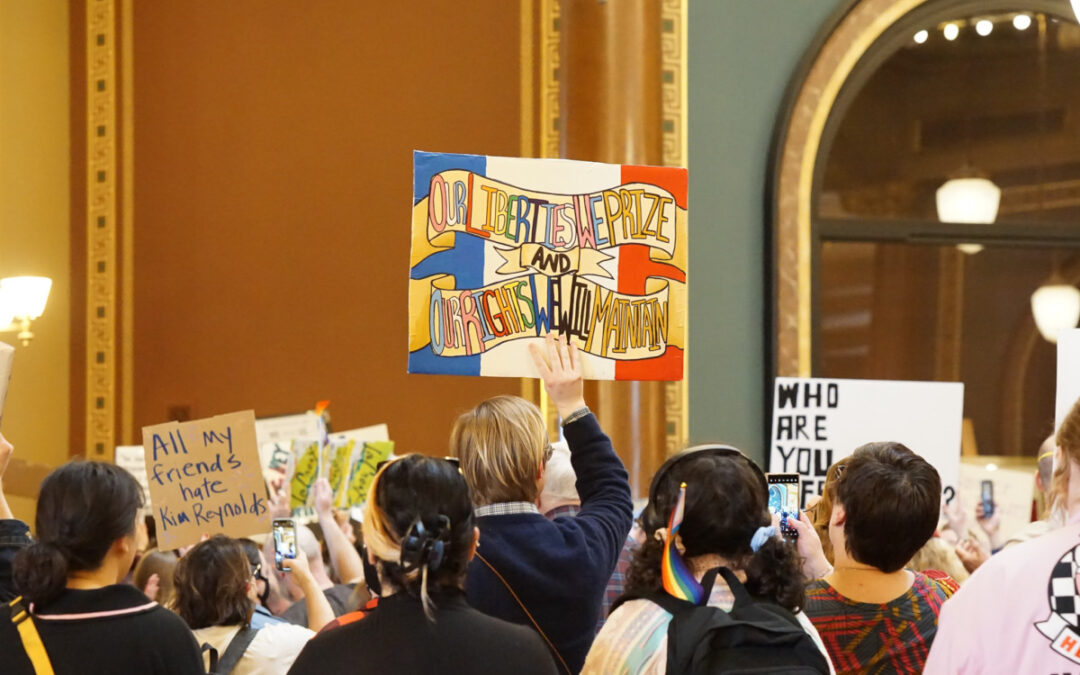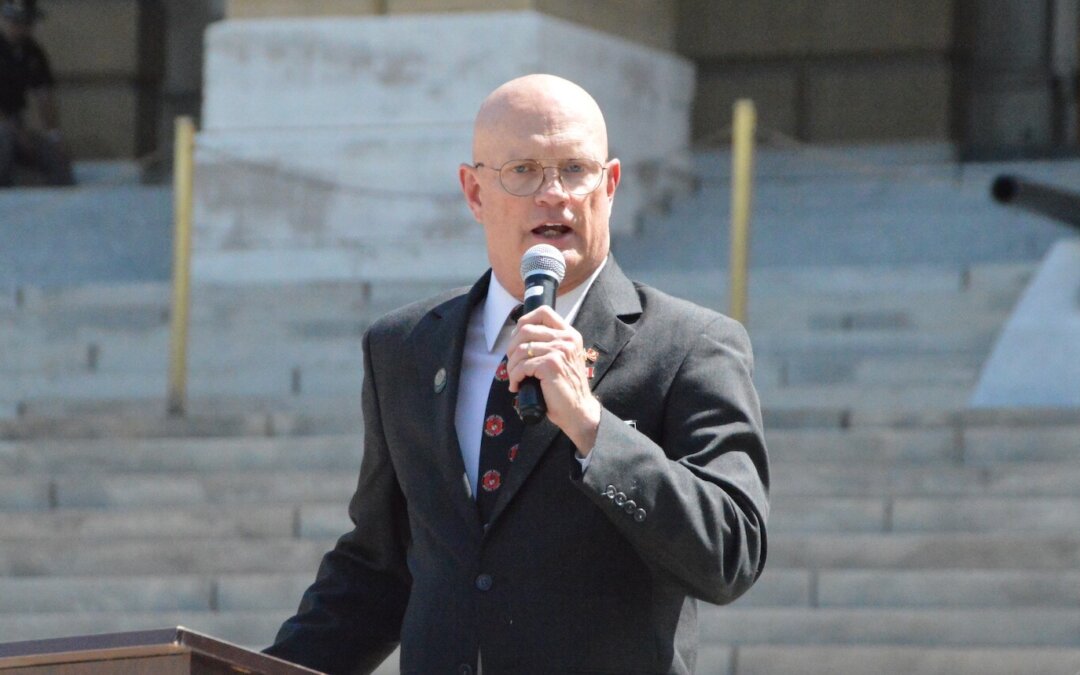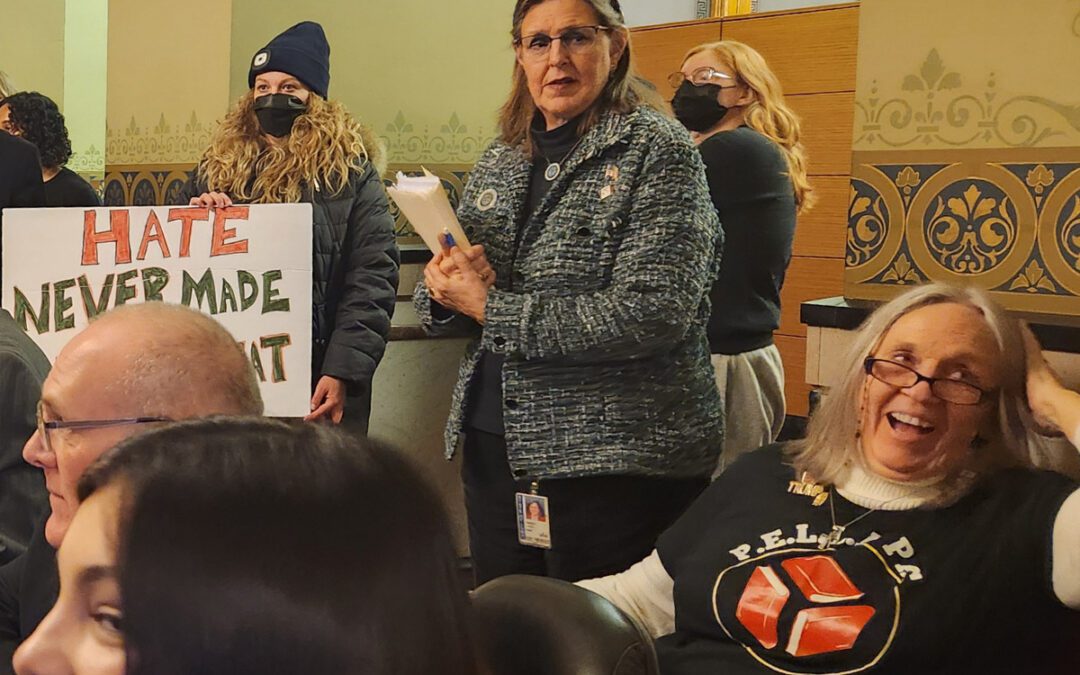
Percy and his mother (left) and Puck (right), two plaintiffs in the lawsuit
Someone threatened to kill Percy Batista-Pedro when he was a freshman performing in the school play.
Now a junior in high school in the Waterloo Community School District, Percy—a transgender student—said he feels like he has a target on his back because of an anti-LGBTQ+ law passed by Iowa Republicans this year and signed into law by Gov. Kim Reynolds.
That’s why Percy, along with six other families, signed on to be a plaintiff in a new lawsuit challenging the law’s constitutionality.
The lawsuit was filed by the American Civil Liberties Union of Iowa and Lambda Legal, a nonprofit civil rights organization focused on LGBTQ+ issues.
“I’m scared of being harassed if I wear pride apparel, or if I talk about my identity in class,” Percy said at a Tuesday press conference. “Transgender youth should not have to live in fear at their schools. We should not have to take unnecessary steps to gain the respect of being called by the correct name and pronouns that no cisgender kid ever has to ask for. It is blatant discrimination and should not be permitted to continue.”
What is the lawsuit about?
The federal civil rights lawsuit was filed Tuesday, Nov. 28. It challenges the constitutionality of SF 496, claiming it violates the First and Fourteenth Amendments as well as the Equal Access Act.
They’re seeking a preliminary injunction, which prevents the law from being enforced while the suit works through the courts.
“SF 496 is a clear violation of public school students’ First Amendment rights to speak, read, and learn freely,” said Thomas Story, a staff attorney with the ACLU. “The First Amendment does not allow our state or our schools to remove books or issue blanket bans on discussion and material, simply because a group of politicians or parents find them offensive.”
Story noted that school districts have scrambled this year to comply because the law isn’t specific enough for the way school districts work, and guidance from the Department of Education has been lacking.
Enforcement of SF 496 is scheduled to begin on Jan.1, 2024, though many Iowa school districts have already taken steps this school year to comply with the law by removing books from school libraries, removing banners and posters supporting LGBTQ+ rights, and banning the use of nicknames and pronouns not in student records.
The lawsuit was filed in US District Court for the Southern District of Iowa-Central Division in Des Moines.
What is SF 496?
SF 496 is a large education bill. Among many other things, it requires the forced outing of students to their parents if they ask a licensed school employee to use a name or pronoun that’s different from the one found on their school registration documents.
The law also prohibits education about gender identity or sexual orientation through the sixth grade, which has already been expanded in some schools depending on how their middle schools are arranged.
It also bans books that contain a “description or visual depictions of sex acts,” which districts have interpreted in a variety of ways, some more extreme than others. Sex acts are described in detail in the definition found in criminal code 702.17.
Why ask for an injunction?
Plaintiffs argue asking for the injunction is justified because SF 496 violates the Constitution by:
- “chilling student speech based on its content and viewpoint,”
- “violating students’ rights to receive information and ideas,”
- “violating students’ rights of expressive association,”
- “being unconstitutionally overbroad and vague,”
- “making classifications based on sexual orientation and transgender status without adequate tailoring and justification,”
- and “violating students’ rights under the Equal Access Act.”
The ACLU is seeking an injunction for the entire law.
Who is harmed by the law?
The motion is reinforced by 11 parents and students—including Percy—who explain how SF 496 has harmed them or made their lives at school harder.
Puck Carlson, a senior in Iowa City, is another plaintiff. She talked about the importance of books in figuring out who she is, and cited “Last Night at the Telegraph Club,” by Malinda Lo, about a Chinese-American teen who explores her sexuality in 1950s America.
“It was thoughtful and nuanced, and extremely relatable, despite the different culture, place, and time,” Puck wrote. “It made me feel both seen and freer to have read it. It also happened to have a short sex scene. This didn’t seem out-of-place at all—sex and sexuality, like it or not, absolutely play a role in teenager life. Exploration is fundamental in teen relationships, so why shouldn’t the literature we read reflect that? However, it is the reason that it is marked as ‘inappropriate’ by SF 496.”
Iowa Safe Schools Executive Director Becky Tayler also submitted a report about the effects the organization has observed when speaking to GSAs (gay-straight alliances or gender-sexualities alliances) at schools across Iowa.
Tayler said LGBTQ+ students are reporting more bullying and harassment because those bullies feel empowered. She said many GSAs have gone inactive or have had to shift their focus away from leadership and personal growth to how to handle SF 496.
How Reynolds responded
Gov. Reynolds issued a response to the lawsuit Tuesday, repeating her claim that the law is meant to remove “pornography” from schools (despite the fact having pornography in schools is already illegal and isn’t happening).
She said books with “graphic depictions of sex acts” don’t have a place in schools, though the few books often used as examples of that are far from the only books being removed.
But Nathan Maxwell, a senior attorney with Lambda Legal, cited successes in similar cases challenging book bans—in Texas and Arkansas—as reason to hope the case in Iowa succeeds.
“We are committed to continuing to challenge any restrictions on student speech wherever they appear,” Maxwell said. “These latest attacks are just another chapter. We think that the law is so clearly unconstitutional as it’s written and as it’s applied, and we’re very confident in our case. We expect the court will agree with us.”
Support Our Cause
Thank you for taking the time to read our work. Before you go, we hope you'll consider supporting our values-driven journalism, which has always strived to make clear what's really at stake for Iowans and our future.
Since day one, our goal here at Iowa Starting Line has always been to empower people across the state with fact-based news and information. We believe that when people are armed with knowledge about what's happening in their local, state, and federal governments—including who is working on their behalf and who is actively trying to block efforts aimed at improving the daily lives of Iowan families—they will be inspired to become civically engaged.


Iowa Republicans advance bill to strip trans civil rights
Iowa House Republicans advanced a bill to remove gender identity from the list of protected classes under the Iowa Civil Rights Act. This has...

Iowa House Republicans renew effort to strip transgender protections from Iowa civil rights law
House Republicans want to remove Iowa’s discrimination protections for transgender Iowans. The bill is a long list touching on bathrooms, birth...

Iowa Republicans advance law that could expose drag performances to obscenity lawsuits
Republicans are pushing to open obscenity laws in hopes of making it easier to sue drag performers. Senate File 116, a bill that follows long-time...

Students: ISU LGBTQ Center turned into ‘generic study lab’ by IA Republicans’ DEI law
Iowa Republicans' decision to restrict DEI programs means the loss of one university's LGBTQ+ center, where students have found friendship and...

Cornhole Champions #1 – Recounting the count
Iowa Democrats didn't exactly get points on the board in 2024. But it's not all bad news. Toss the bags with us as we get a temperature check on...

Attack on LGBTQ+ student group enabled by Iowa’s anti-LGBTQ+ bills
Linn-Mar's LGBTQ+ student group was attacked at the school's homecoming parade. Here's why the Iowa Legislature is on the hook. What do you remember...




